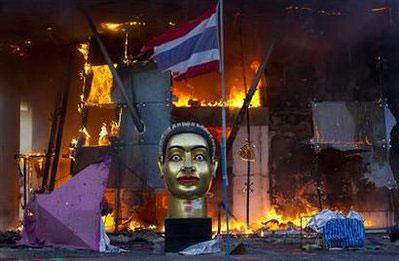Top News
Bangkok in flames after army storms protest camp
(Agencies)
Updated: 2010-05-20 06:52
 |
Large Medium Small |
BANGKOK – Buildings blazed across central Bangkok early Thursday, torched by rioters after army troops routed anti-government protesters to end a two-month siege, Thailand's deadliest political violence in nearly 20 years.
The government quelled most of the violence in Bangkok but not the underlying political divisions that caused it, and unrest spread to northern parts of Thailand.
Prime Minister Abhisit Vejjajiva imposed a nighttime curfew in the capital and 23 other provinces and said his government would restore calm. Although leaders of the Red Shirt demonstrators surrendered, sporadic clashes between troops and remaining protesters continued well after dark.
At least six people were killed in clashes that followed the army's storming of the protest camp Wednesday. Witnesses said another six to eight bodies were in a temple where hundreds of demonstrators, including women and children, had sought sanctuary.
Since the Red Shirts began their protest in mid-March, at least 74 people, mostly civilians, have been killed and nearly 1,800 wounded. Of those, 45 people have died in clashes that started May 13 after the army tried to blockade their 1-square-mile (3-square-kilometer) camp.
While many of the rioters were believed to be members of the Red Shirts and their sympathizers, there was also an element of criminals and young hoodlums involved in the mayhem in the city of 10 million people.
The protest and violence in Thailand has damaged its economy and tourism industry.
With the top Red Shirt leaders in custody, it was unclear what the next move would be for the protesters who had demanded the ouster of the prime minister's government, the dissolution of parliament and new elections. The protesters, many of them poor farmers or members of the urban underclass, say Abhisit came to power illegitimately and is oblivious to their plight.
The crackdown should silence the large number of government supporters who were urging a harder line, and the rioting that followed may extinguish the widespread sympathy many had for the protesters' cause.
But that same violence also showed a serious intelligence lapse by the military, and the failure to secure areas of the capital raised doubt over how any unrest in the protesters' heartland of the north and northeast can be stilled.
Many Thais feel that any short-term peace may have been purchased at the price of further polarization that will lead to years of bitter, cyclical conflict.
"The Reds rampaged and committed to armed resistance," said Thitinan Pongsudhirak, a political scientist from Bangkok's Chulalongkorn University. "Right now, they are just burning buildings, but later on, what if they picked up arms to fight the bureaucrats, security forces in other parts of Bangkok, and especially in the countryside? So this is just the beginning. The crackdown didn't make them retreat fully. Things will get much worse still."






